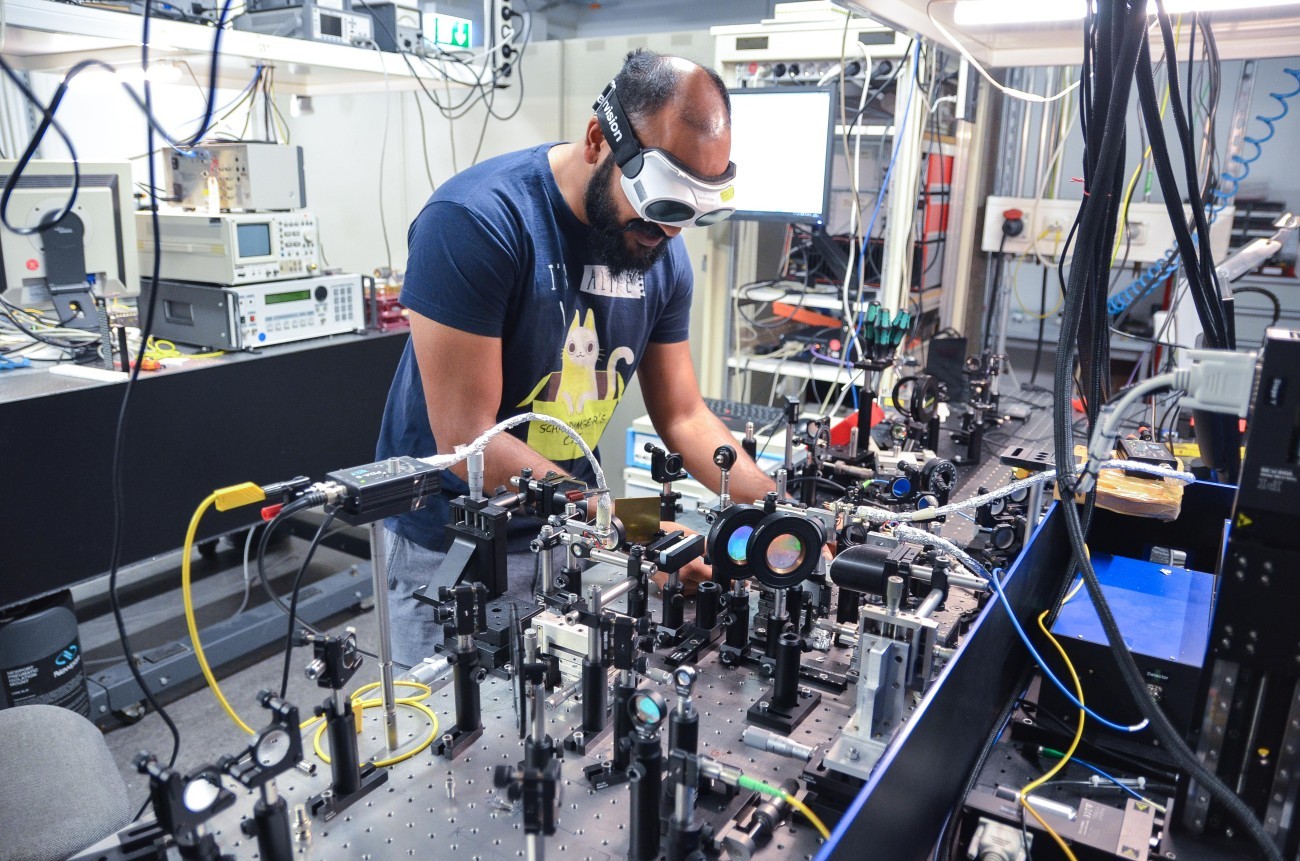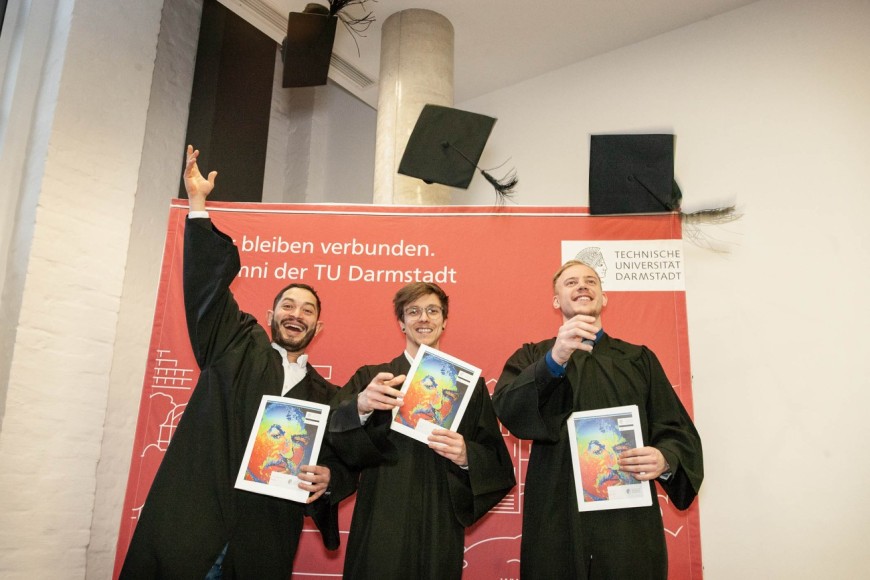Published: 13th May 2022
Dr Ing Carolin Hessinger,
post doc at TU Darmstadt at the Institute for Microwave Technology and Photonics
Studying physics only, that wouldn't have been me, that would have been too theoretical − that is why the etit degree appealed to me.
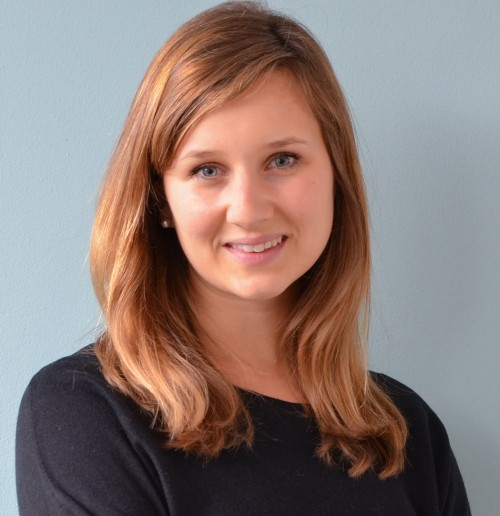
More than just basic studies
Admittedly, with its countless technical degree programmes, TU Darmstadt is a veritable eldorado for all science and technology enthusiasts and thus an important location of the Germany Silicon Valley. However, the Department of Electrical Engineering and Information Technology deserves a special spotlight here. Why is that? Because etit leads to a comprehensive understanding of processes like no other degree programme, as Dr Ing Lisa Koch, former etit student and currently Professor of Automation and Control Engineering at Darmstadt University (h_da) states: “I wanted to work with software and hardware, to understand both, and Electrical Engineering is a great compromise. You learn how to code, but you also learn how the electronic circuits behind it work, how the hardware works.”
During your studies you will learn to understand the big picture. Sounds like a totally useful all-purpose study, doesn't it? And it is! To ensure that this is the case and that you can understand how omnipresent Electrical Engineering and Information Technology is nowadays, you must know the basics. That's why the Department of Electrical Engineering and Information Technology has put together an elaborate study plan for your bachelor's degree, during which you will receive a comprehensive mathematical, scientific, and technical education. The goal behind this is simple: you will later be able to plan and realise electrotechnical and information technology components and systems. Even if that sounds quite abstract at first, you will understand the processes much better once you’ve mastered the basics, quoting Bernd Freyermuth, former etit student and currently managing director of LensWare GmbH: “This gives you a holistic view of everything and a holistic way of recognising and learning processes.“
According to Freyermuth, this understanding of processes was decisive for his entry into the ophthalmic industry after his PhD: ”That was something completely different, but process computer technology was needed there, specifically for the automated processes of ophthalmic lens production. Because of my knowledge of process computer technology, I then started to automate the whole company while getting to know the industry in its totality." This knowledge also contributed to the success of his company LensWare GmbH, which he later founded. The globally successful company with 20 employees and an office on every continent is the market leader in the field of production solutions for small and medium-sized ophthalmic lens manufacturers in Europe.
Dr Ing Bernd Freyermuth,
CEO of LensWare GmbH
Glasses are highly individual: everyone has different eyes. We automate the production of large ophthalmic lens manufacturers. Our biggest customer is Fielmann. We do the entire process automation here in Germany, where they produce up to 30,000 pairs of glasses per day.
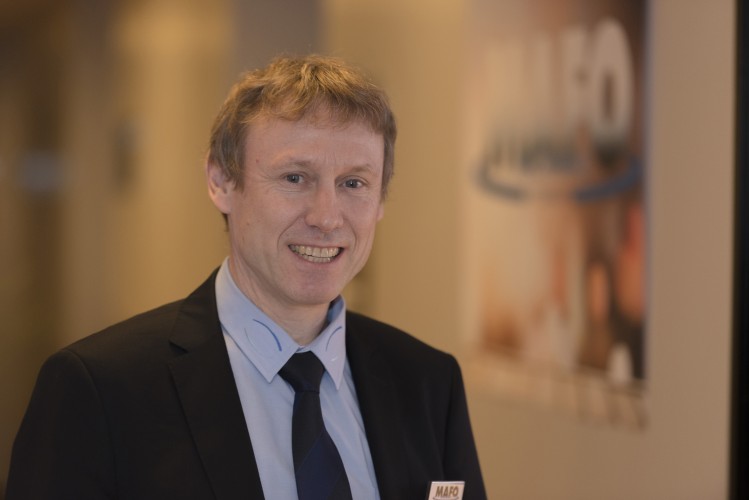
As colourful as a bouquet of flowers − etit at TU Darmstadt
For Bernd Freyermuth, studying Electrical Engineering and Information Technology has been the right decision and the best foundation for his company LensWare GmbH. The holistic nature of the etit degree, guaranteed by learning the basics of “how to do what: hardware, software”, have contributed significantly to the success of his company, so he tells us. With LensWare GmbH, he and his team have created their own small and successful market niche: “There are almost no companies in the world that supply such software systems.” Of course, the commitment of the entire team and their top qualifications are central to this success.
Now you have already gained an insight view into what you can expect during your studies and how you can use what you have learned later in your professional life. However, the career path of our alumnus Bernd Freyermuth is only one of many that you can take. The Department of Electrical Engineering and Information Technology offers you a wide range of options from which you can choose your desired specialisation according to your interests and skills. A total of six possible research fields are available to you − there is definitely something for everyone. Whether you want to work in the automotive industry, contribute to research and teaching or create a more sustainable future for all, the possibilities are sheer endless!
The most important thing for you right now: the etit programme offers you the opportunity to pursue your own interests and skills and to choose your desired specialisation already during your bachelor's degree. This has the advantage that your career options are just as broad as the degree programme itself − as colourful as a bouquet of flowers. This is also emphasised by former etit student Carolin Hessinger, who now works as a post doc at the Institute for Microwave Technology and Photonics: "The etit programme is super interdisciplinary, almost every subject area has cooperations, not only within the same subject areas, but also with medicine or biology, material sciences or mechanical engineering − it is very diverse.“
In close cooperation with the industry
Another advantage: the etit Department − like TU Darmstadt itself − enjoys a positive reputation in the industry all over Germany. For this reason, you have a variety of opportunities to conduct your own research in cooperation with the industry as part of your bachelor's thesis. Rashid Hussain, a former etit student, proves this to us: through contacts provided by his professor, he got an industrial cooperation with Momentive Performance Materials for his doctorate. This was an important step for him, as he applied to various cable manufacturers in the industry after completing his dissertation in the field of high-voltage technology: “I knew that direct current lines, also known as 'corridor projects', are planned in Germany as part of the grid extension for the energy revolution. Worldwide, there are very few companies that qualified for this and ultimately won the projects. Since I had dealt with this topic very intensively during my doctorate, I ended up applying specifically to these companies.”
Dr Ing Rashid Hussain,
Cable Design Engineer at NKT
This is a completely new technology: such projects have never been realised at the voltage level of 525 kilovolts direct current. This is the very first time in Germany and worldwide.
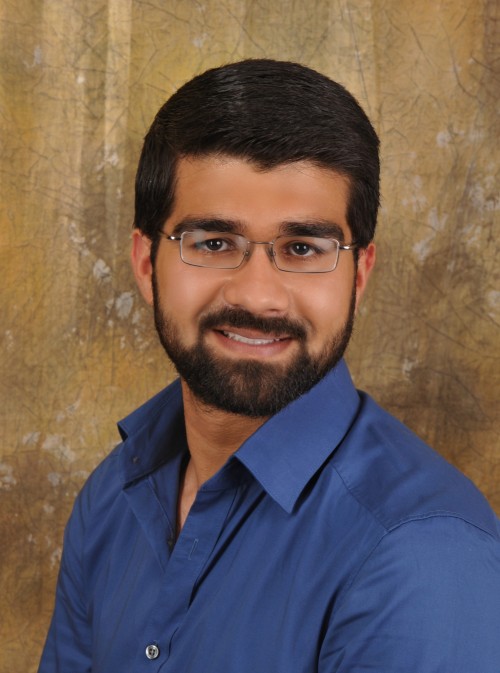
Shaping tomorrow's world
As a cable design engineer, Rashid Hussain works for the Danish industrial company NKT and is responsible for the cable design and the necessary laboratory tests for the SuedLink corridor project. This is a prestigious and symbolic pilot project: a power line to transport wind power from the north to the high-consumption south of Germany with a total length of about 750 km in form of a high-voltage direct current transmission (HVDC) at a voltage level of 525 kilovolts. “This technology is being used for the first time in the world and represents an important part of the energy revolution and the resulting grid expansion. It's not just the engineering you have to operate to make it happen, but also the logistics, and installing such a volume of power cables, it's all completely new.” Sounds like an exciting job that contributes to the energy revolution at the same time − great, right? With a degree in etit, the doors to forward-looking jobs like these are open to you as well!
For example, how about contributing to medical improvements and developing innovative solutions for diseases? With an etit degree you are already on the right track, as you can see through the career of Carolin Hessinger. She works as a post doc in research management and supervises various research projects in the field of microwave technology for biomedicine: “Microwave technology is basically known from classic communication technology, i.e. radio. It all runs on high-frequency microwave technology and is basically electromagnetic fields that propagate, for communication in the air − from A to B − from radio mast to radio mast. For biomedicine, we use this field propagation to evaluate reflected signals and thereby have a sensory property, in this way we can detect cancer, for example.”
Dr Ing Carolin Hessinger,
post doc at TU Darmstadt at the Institute for Microwave Technology and Photonics
A supposedly big problem in Electrical Engineering and Information Technology, and especially among women, is that there is no job profile of an electrical engineer. It is a very diverse field, but one that is difficult to break down. That's something that characterises electrical engineering to a certain extent. There is not the one single professional field.

Let's go, girls!
It's true that there is not only the one job title for electrical engineers − it's different if you study medicine or history to become a teacher. What sounds like a tough fate, however, is actually a door opener to diverse and varied professions. With an etit degree, you have countless opportunities to enter exciting professions and to help shaping the world of tomorrow! Even though male students dominate in the etit studies, this is no reason to be discouraged as a woman. For Carolin Hessinger, a PhD in engineering at TU Darmstadt, the low rate of women in her class was not an obstacle: “It was not an issue during my studies. I would study it again and again – that’s why I want to encourage women and girls to study electrical engineering or engineering!”
The same applies for our second power woman, Lisa Koch. She is a professor for Automation and Control Engineering at Darmstadt University (h_da) and the head of the correspondence master's programme in Electrical Engineering. Sounds impressive, doesn't it? She also studied Electrical Engineering at TU Darmstadt and then did her doctorate on biologically motivated optimisation at the Department of Control Methods and Robotics. Sounds even more impressive? It absolutely is! Her research is about learning something from nature and transferring and optimising it to movements, things, forms, and technology: “Imagine a branch. Down there, where the branch comes off the trunk, the branch is thicker. It automatically grows thicker there, so that the branch doesn't just snap off. That's exactly how you can also strengthen something in mechanics or statics.”
After her doctorate, she landed her first job at Opel, one of Germany's major automotive companies. Here, too, her etit studies were a major benefit: “You noticed − especially in the current change − that the mechanical engineers had often reached their limits. And actually, more control engineers, more electrical engineers were needed.” etit promises innovation where classical methods have reached their limits − “An electric motor works differently compared to an internal combustion engine,” Lisa Koch tells us grinning.
Dr Ing Lisa Koch,
Professor of Automation and Control Engineering at Darmstadt University (h_da)
The control engineer is relatively universal, and the fact that more and more is being automated and controlled means that more control engineers are needed. More processes are being automated where previously there was someone who did it manually.
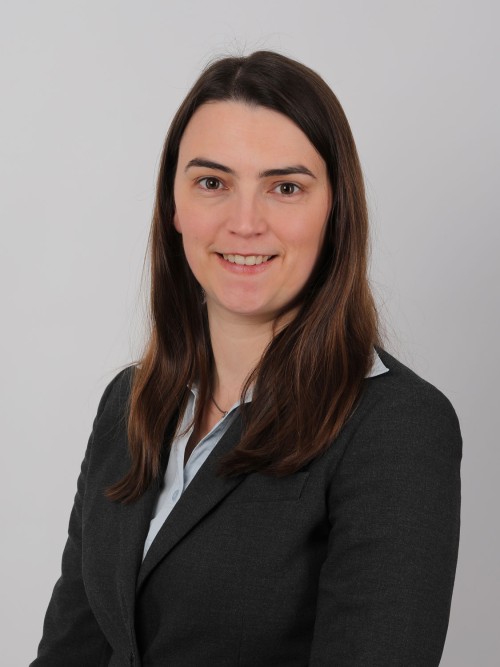
Spoilt for choice
In our modern world, which constantly strives for improvement, automation, optimisation and innovative solutions, electrical engineers will always be in demand − the employment opportunities are already incredibly diverse. When hearing the name etit, the first association that probably comes to your mind is with the electrical and electronics industry, isn't it? We felt the same way at first. But after the interviews with our four alumni and their individual careers, this image has been thoroughly revised.
Let's summarise why etit is exactly the right degree programme for you: with its countless specialisations and exciting cooperation options, the Electrical Engineering degree programme is ideal for pursuing your own interests and skills from an early stage. By the way, many students already establish contacts with the industry through cooperations, which will later benefit both you and your career. etit means freedom and individuality: as an electrical engineer, you have many career options available − exciting and versatile jobs are waiting for you. Whether you want to pass on your knowledge to the next generation, find innovative solutions to current and future problems or make your contribution to a more sustainable world − there are no limits with etit!
What etit offers you
- etit students shape the future of tomorrow.
- etit´s degree programme offers an excellent basic education as well as a uniquely broad range of specialisation options.
- The department of etit is one of the leading institutions in the field of both teaching and research.
- Our international and interdisciplinary networks offer the best opportunities to think outside the box.
- With an etit degree, there are excellent opportunities on the job market.

Dr Ing Bernd Freyermuth
Hello, I am Bernd Freyermuth and CEO of LensWare GmbH, the European market leader in the field of production solutions for small and medium-sized ophthalmic lens manufacturers. My father and uncle were engineers, so I wanted to do the same. After studying Electrical Engineering and a first job in the ophthalmic industry, I finally took the risk to start my own business.

Dr Ing Carolin Hessinger
Hello everyone, my name is Carolin Hessinger and I am a post doc at the Institute for Microwave Technology and Photonics at the Department of etit. My job is research management, or more precisely, networking, looking at where and how we can push our research forward and finding cooperation partners in Germany and worldwide.

Dr Ing Rashid Hussain
Hello, I'm Rashid Hussain and I work at NKT as a cable design engineer on the SuedLink corridor project, one of the power lines to transport wind power from the north to the south. With a total length of 750 km and a voltage level of 525 kilovolts direct current, the technology is being used for the first time worldwide and is an important part of the energy revolution.

Dr Ing Lisa Koch
Hello, my name is Lisa Koch and I am a professor of Automation and Control Engineering and study programme director of the correspondence course in Electrical Engineering at Darmstadt University.

